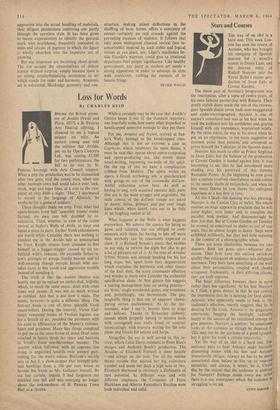Stars and Courses
114 THE way of an idol is a hard one. This week Lon- don has seen the return of Antonio, who has brought his company of Spanish dancers for a month's season to Drury Lane, and the delayed entry of Rudolf Nureyev into the Royal Ballet's recent pro- duction of Swan Lake at Covent Garden.
The finest part of Antonio's programme was the resumption, after a lapse of twelve years, of his once famous partnership with Rosario. Their gently stylish duets made the rest of the extrava- gant Spanish dance revue look over-exaggerated and under-choreographed. Antonio is one of nature's comedians and was at his best when he took the audience into his confidence and, guying himself with coy impudence, improvised wildly. By the same token, he was at his worst when he put on an expression, to me more suggestive of stomach pains than passion,' and attempted to prove himself the Valentino of the Spanish dance..
Nureyev has much to offer as Prince Siegfried ' in Swan Lake, but the balance of the production at Covent Garden is loaded against him. It was interesting to see that he had introduced more shading into his portrayal of this dummy Romantic Prince. At the beginning he now gives him a certain reserved cheerfulness to add colour to the moody shafts of melancholy, and when he first meets Odette he now shows the unfeigned happiness of a boy first in love.
All this I liked—his dancing was less pleasing. Nureyev is the Cassius Clay of ballet. His whole manner on stage appears to proclaim that he will jump higher, turn faster and, to complete the parallel, look prettier. And disconcertingly he does just that. But at Covent Garden on Tuesday he seemed so concerned to shake us out of our seats, that he almost forgot to dance. Steps were exhibited brilliantly, but they had little meaning in the context of a choreographic whole.
There are some similarities between the two dancers. Both are great stars—whatever that means. They both have this curious switch-on quality that subjugates an audience into delighted murmurs. They both have something of the waif about their personalities, coupled with cheeky arrogance. Technically, in their differing idioms, they are both supreme.
The basic difference between them is more rather than less significant. At his best Nureyev is, I think, a great dancer in that he can convey the impression that he is dancing for God alone. Antonio, who apparently needs to bask in the audience's affection, merely suggests that he is dancing for the Gods. Antonio is the gregarious entertainer, hugging the limelight, radiantly happy at the success of his calculated attempt to give pleasure. Nureyev is-austere: he sometimes looks at the audience as though he despised it. This may not be the attribute of a good qoupert but it gives his work a certain objectivity.
Yet the way of an idol is a hard one. The audience pays to hear Antonio make fantastic drumming noises with his feet and Antonio insouciantly obliges. Always he has to be more sensational than before to live up to rose-1 ed memories, and always, it seems, he is. Could this be the course that his audience is plotting for Nureyev? Perhaps inside every star artist there is a star entertainer which the audience is struggling to let out.
CLIVE BARNES


































 Previous page
Previous page